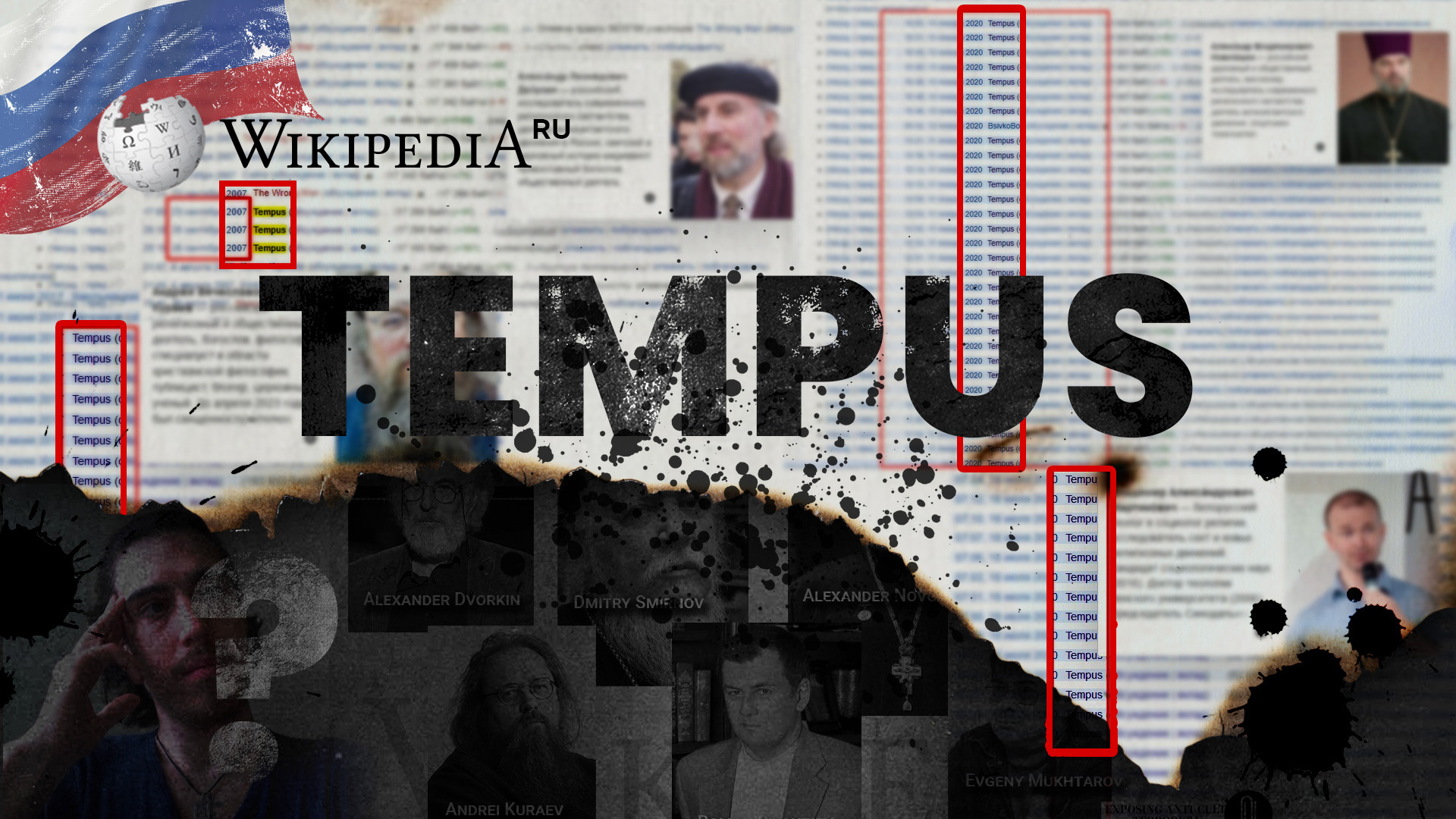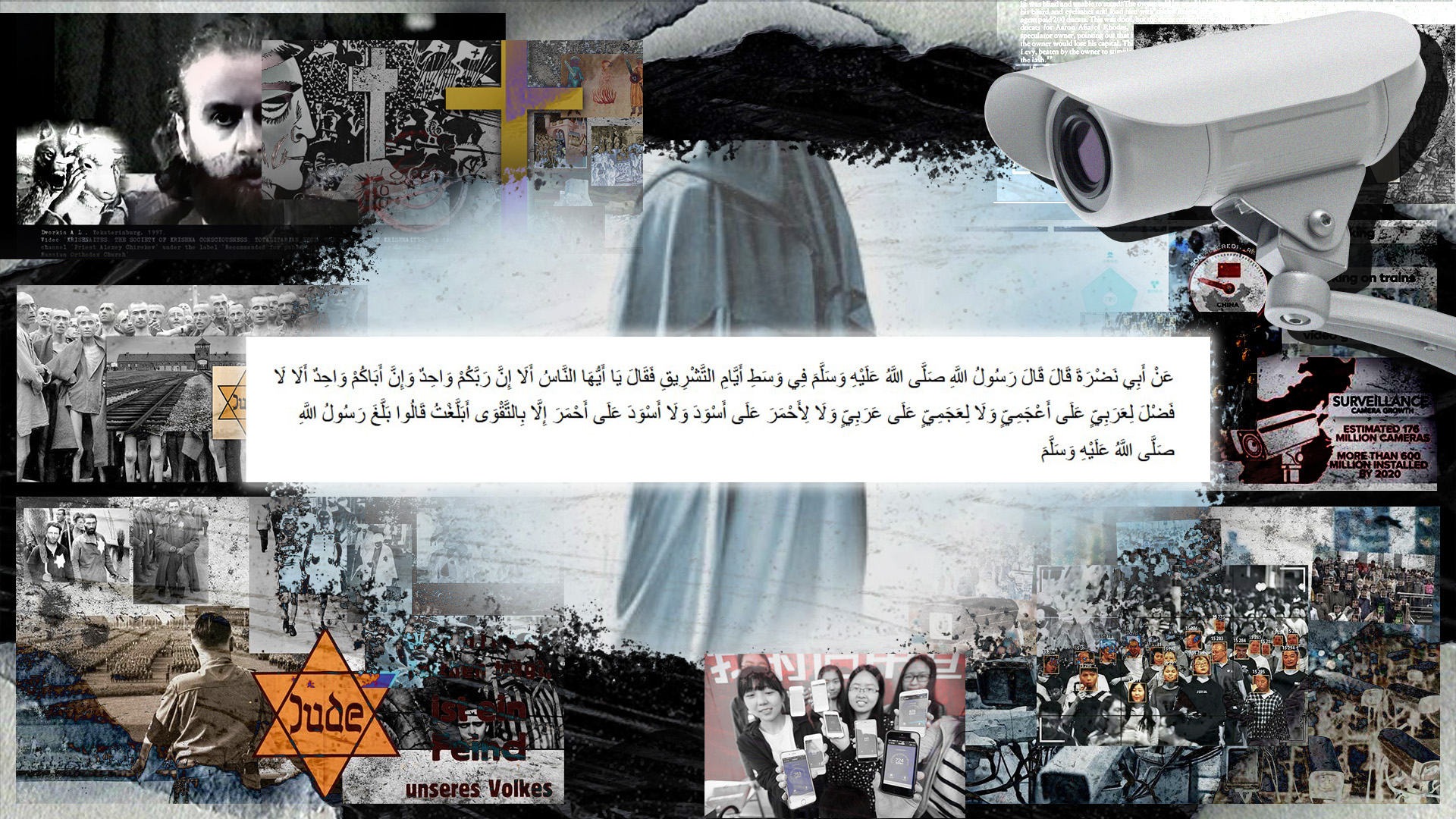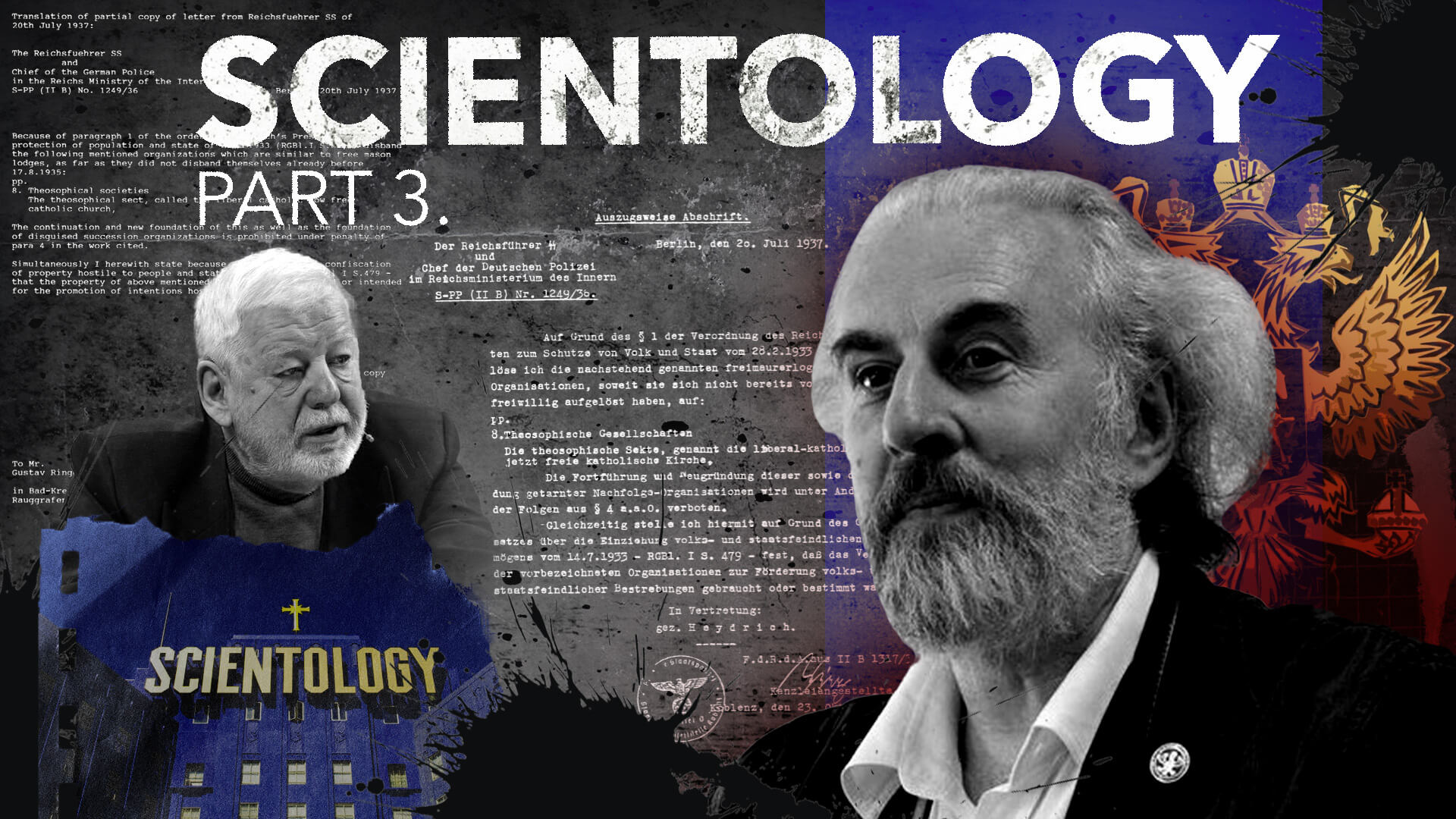When we turn to popular online resources for information or news, we tend to trust them and expect objective assessments. However, more often than not, we find ourselves falling prey to distorted information, deliberately crafted to serve someone’s interests and goals. In this way, someone subtly shapes our beliefs and worldview.
With this publication, we begin a series of articles dedicated to how anticultists influence public opinion through the Free Encyclopedia, Wikipedia. For the first time on the Internet, based on open facts, we will expose the carefully constructed system of anticult propaganda which not only spreads false information, but also actively builds a positive image of its leaders and ideologues — people who should have long been sitting in the dock. We will connect many links in this chain.
After reviewing the materials provided below, several key points will become clear to the reader:
- The center of global anticultism is currently based in Russia.
- The Russian Association of Centers for the Study of Religions and Sects (RACIRS) is directly connected to this center and serves its interests.
- Over the past twenty years, global anticultism has actively shaped public opinion through the Free Encyclopedia, Wikipedia, in the Russian-speaking segment.
- Through Wikipedia, they have crafted a positive image not only of their Russian leaders, but also of international ones.
- They have used Russian Wikipedia to shape the reputation of modern ideologists of nazism and fascism.
- They have influenced public opinion on a vast array of information through Russian Wikipedia, from basic religious, philosophical, and historical concepts to the biographies of specific individuals, presenting them in a way that suits their agenda.
Finally, it will become clear why the international network of anticult organizations is portrayed in “The IMPACT” documentary as an octopus spreading its corrupting influence in various directions throughout various countries.
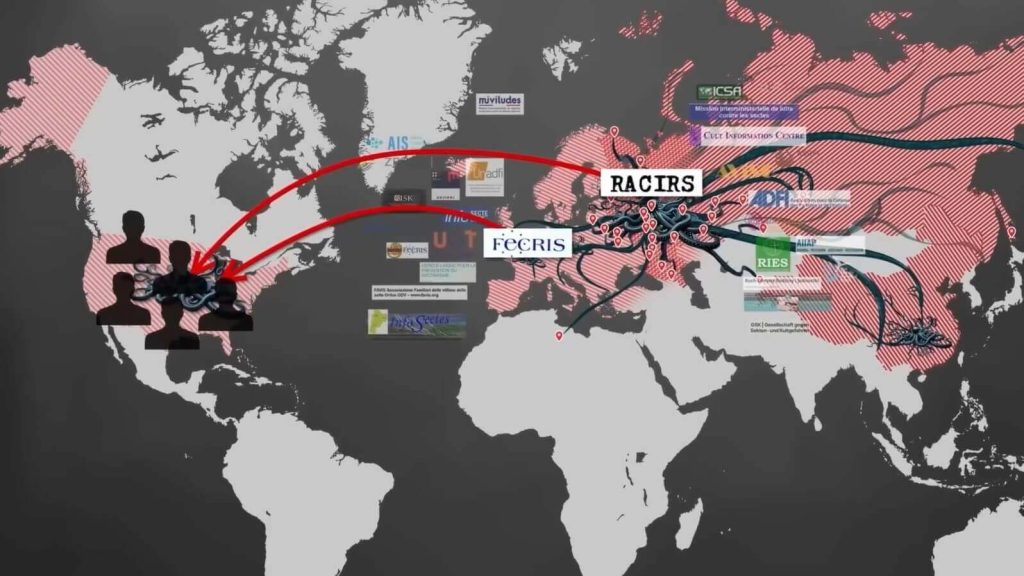
Let’s take it step by step and explain how we came to this discovery. While studying materials about the American anticultist Rick Ross, we noticed significant differences between the English 1 and Russian 2 versions of his Wikipedia page. This caught our attention and urged us to delve into the edit archives of both versions. As we examined those records, we decided to investigate whether the edits were made by individuals previously involved in anticult informational campaigns. After some time, we discovered unusual activity by a user going by the alias Tempus. Our amazement grew with every new step we took in delving into his background.
It soon became apparent that over the last 18 years, Tempus has had a far greater influence on shaping the anticult agenda than we initially imagined. We came across something that still requires a more objective evaluation in the future, but for now, we will try to describe the gist of what we found.
Before going into details, let’s imagine a typical scenario. After watching the sensational film “The IMPACT”, which reveals the influence of a transnational anticult network with the current headquarters in Russia, let’s assume the average Russian viewer decides to fact-check the story and verify the information, using critical thinking. Likely, they would go online to search for information to see how accurately the film portrays the situation. Their initial steps would probably involve searching for the key figures and organizations mentioned in the investigative documentary. A list of search terms might look something like this: “Anticult movement,” “Rick Ross,” “Alexander Dvorkin,” “Alexander Novopashin,” “RACIRS,” “Center in the name of Irenaeus of Lyon,” “FECRIS,” “Johannes Aagaard,” “Friedrich Haack,” “totalitarian sect,” “Falun Gong,” “Jehovah’s Witnesses,” “school shootings,” and so on.
Please note that from this point forward, the discussion will focus solely on the Russian version of Wikipedia. We hope to address the English version a little later, but for now, let’s follow the trail without delay.
So, for each of these search queries, a person who wants to figure things out will probably come across the top-ranked Google pages of the Free Encyclopaedia, Wikipedia. The person will read them. Probably, with interest. They might jot down notes, memorize certain points, or draw conclusions. And more than likely, they’ll come across contradictions and inconsistencies.
Why?
No matter what their conclusions might be, there is an aspect they are probably unaware of: who exactly was behind the creation and editing of all those Wikipedia pages. It was a real cultural shock for us to realize that behind each of the key search terms listed above, there was just one person!
Ilya Porkhachev, or the “ubiquitous Tempus”
Please meet Ilya Porkhachev, known as the Wikipedia user Tempus — one of the Russian Wikipedia patrollers! An optimistic, romantic and aesthetic young man born in 1988 in the Siberian city of Krasnoyarsk. We found his photo thanks to an article titled “Ilya Porkhachev with alias Tempus as an asset for cultologists on Wikipedia” 3.
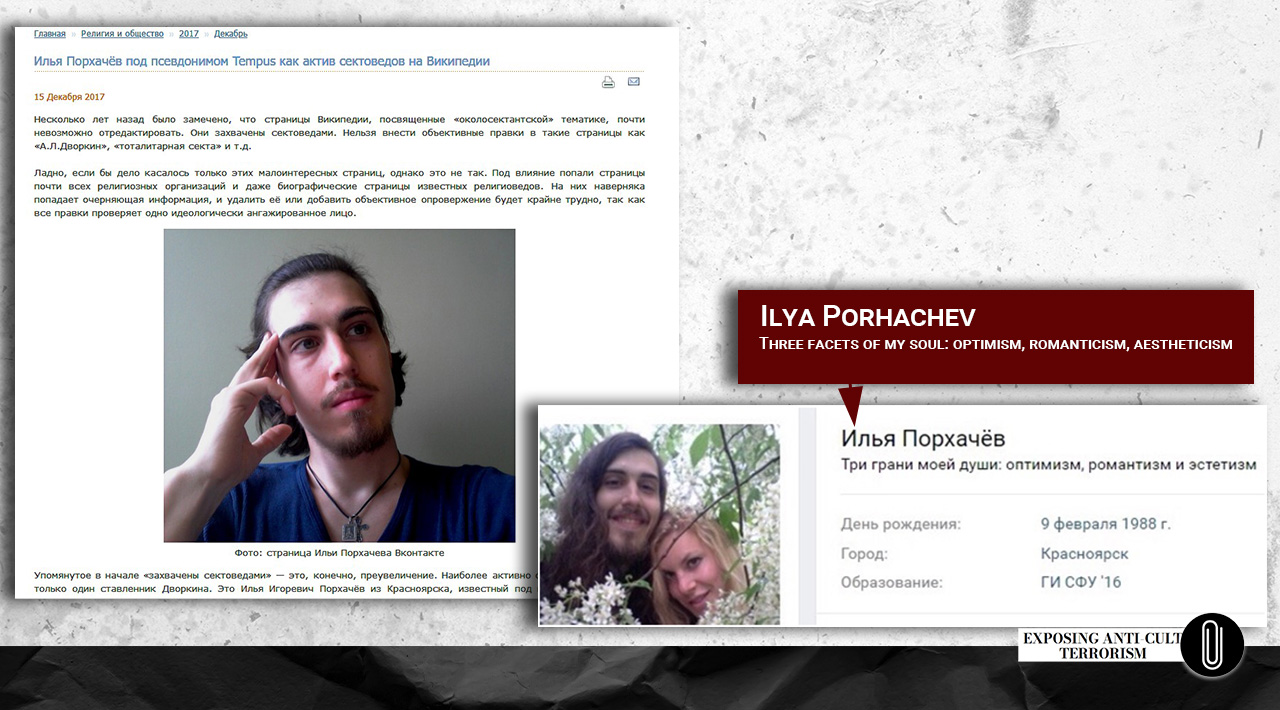
It turns out that in 2017, a group of Ukrainian journalists had already tried to figure out how it happened that pages on “cult- and sect-related” topics in the Russian Wikipedia became nearly impossible to edit. They were puzzled as to why it wasn’t allowed to make objective edits to pages like “Alexander Dvorkin” and “totalitarian sect.” Moreover, this influence extended to the pages of almost all religious organizations and even the biographies of well-known religious scholars. Surely, defamatory information must have been added to those pages, and removing it or adding objective rebuttals seemed impossible because all edits were reviewed by just one ideologically biased person.
His name is Tempus!
Here’s a quote from the article:
“But when I saved those edits, within two minutes they had been deleted,” said attorney Olga Panchenko who attempted to edit the article about Massimo Introvigne. “I decided to try again, and sure enough, the same thing happened the second time. So the point is — Massimo Introvigne must be portrayed negatively! It doesn’t matter if there are sources or not, whether they are credible or not — that’s irrelevant. The only thing that matters is that he must be seen in a bad light. And it doesn’t matter how it’s done, even if it means violating Wikipedia rules.”
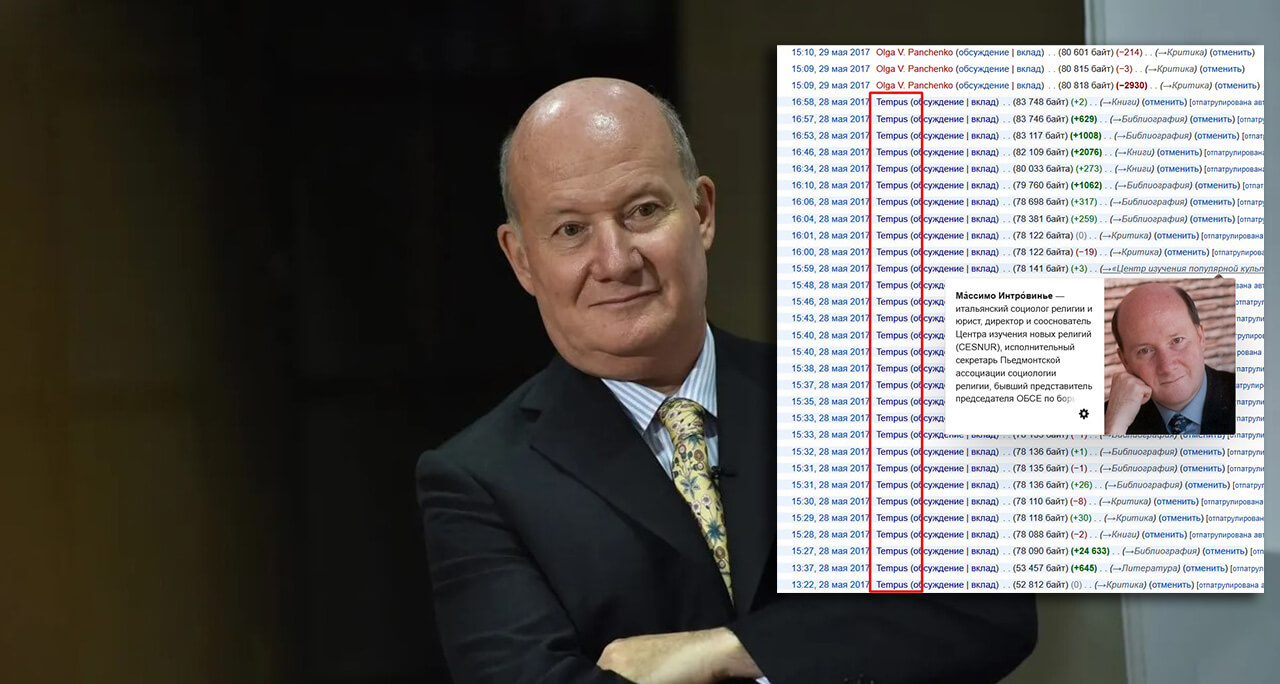
Why must Massimo Introvigne be portrayed negatively on Wikipedia? Perhaps because, as the author of “A magazine on religious liberty and human rights, Bitter Winter” (www.bitterwinter.org), Introvigne is one of the most prominent human rights advocates on issues of religious freedom and has been exposing anticult abuses worldwide. His website is popular among religious scholars, and we frequently refer to it to stay updated on the latest news.
In 2017, Ukrainian journalists touched upon the topic of the Russian Orthodox Church’s lobbying influence on Russian Wikipedia as part of their investigation. In that material, they interviewed Massimo Introvigne, which we might discuss later. However, for now, we want to focus on the details that were left out of that investigation, and we must admit, they astonished us!
Who is behind the mask of Tempus?
Now let’s get serious.
Wikipedia is a unique resource, especially because of its open editing policy. On its pages you can learn almost everything about the activity of its editors and compilers.
Porkhachev, Ilya Igorevich. Alias: Tempus 4. The first edit was made on April 30, 2006.
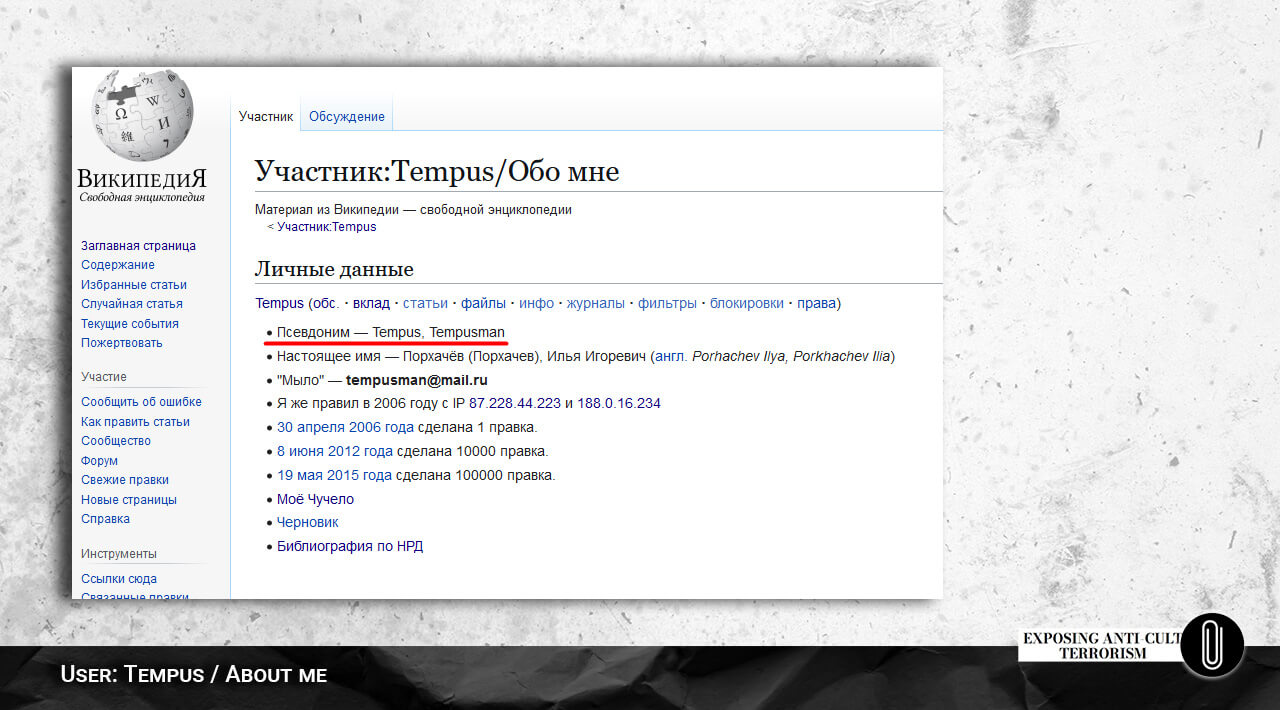
User: Tempus/About me
- Personal Information
- Alias – Tempus, Tempusman
- Real name – Porkhachev, Ilya Igorevich (Eng. Porhachev Ilya, Porkhachev Ilia)
- I edited from IP addresses 87.228.44.223 and 188.0.16.234 in 2006
- Made my first edit on April 30, 2006
- Made my 10,000th edit on June 8, 2012
- Made my 100,000th edit on May 19, 2015
- …
- …
- Bibliography on NRMs (new religious movements)
The first thing we checked was the location of the two IP addresses listed in his personal info. The first was traced to Moscow and the second to Krasnoyarsk Krai. So, part of Ilya Porhachev’s story holds up: a young man born in 1988 and residing in the vicinity of Krasnoyarsk, a Siberian city.

What is the second thing that immediately stands out on Tempus’ main page? References on NRMs (new religious movements). That’s an outright anticult topic! The link leads to a large separate page where the opening section, “General Literature on NRMs,” includes a list of over 100 works 5. Among them is “Sectology” (“Cult Studies”), the book by notorious Alexander Dvorkin, that has become sort of a “Bible” for Russian sectologists.
Below is only a partial screenshot of the top of that page.
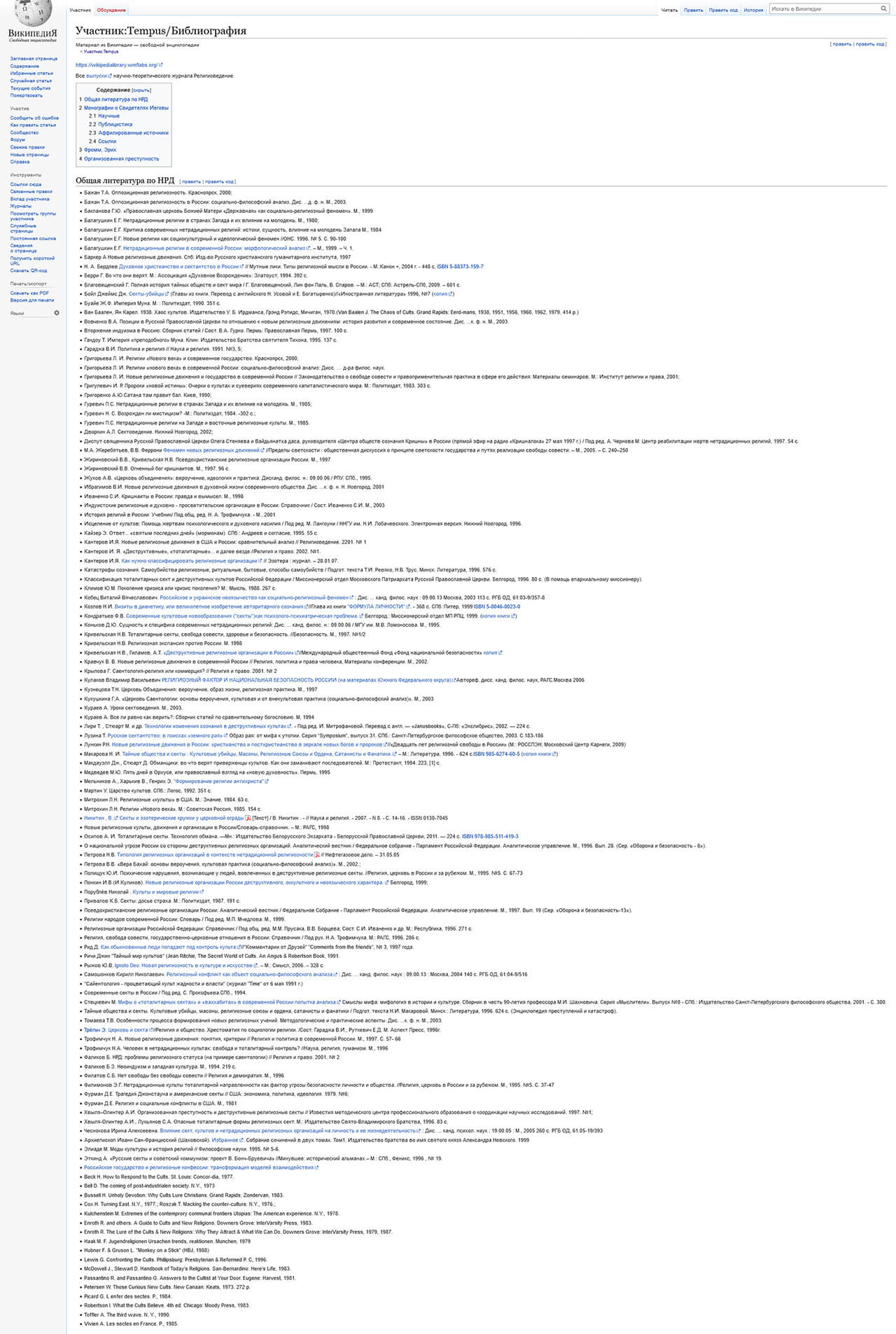
The next section in Tempus’ bibliography, “Monographs on Jehovah’s Witnesses,” is an impressive list of over 150 works!
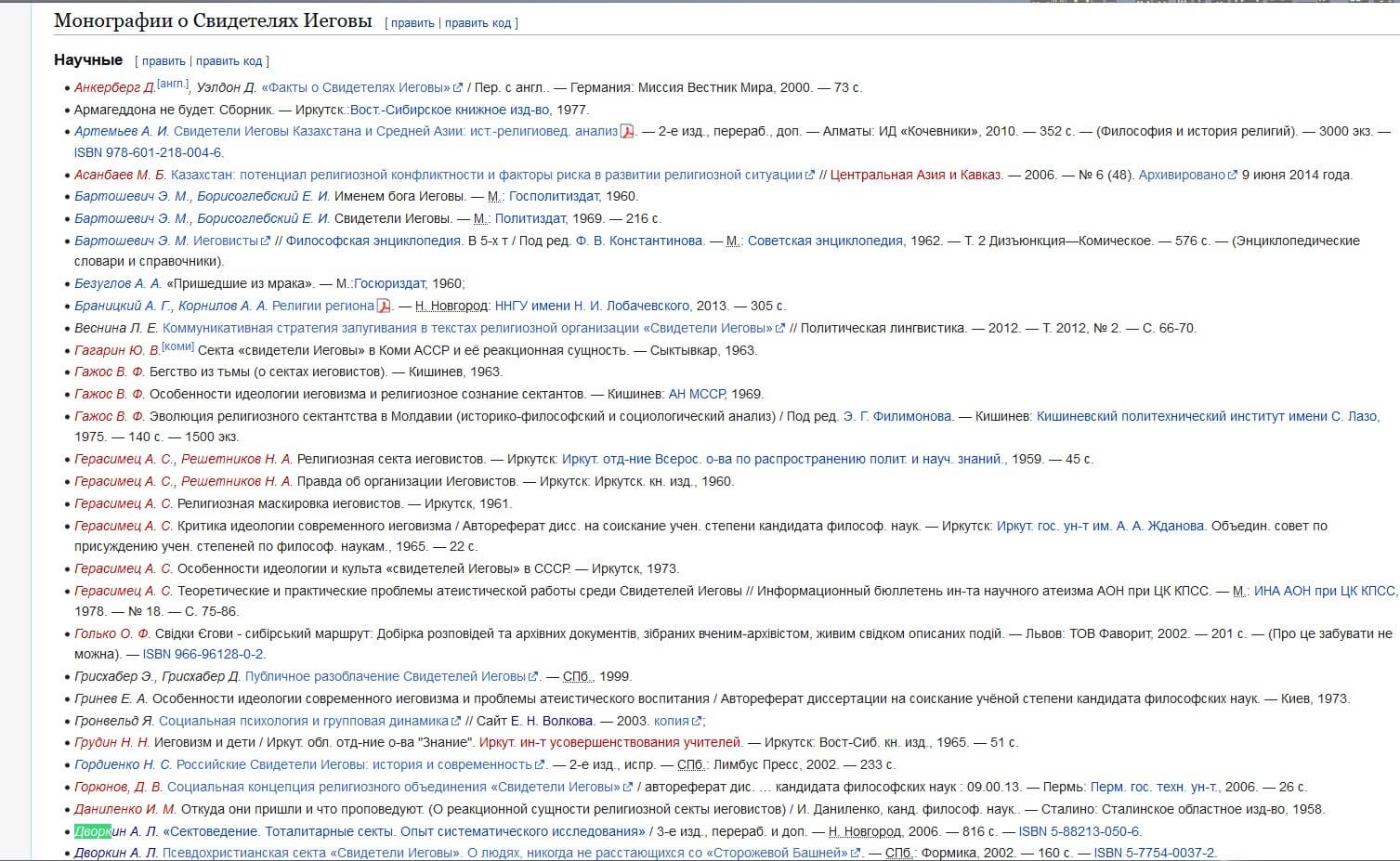
This naturally led us to examine Alexander Dvorkin’s Wikipedia page. To our surprise, we found that its first edit by Tempus dates back to 2007.
Well, let us shed some light on this situation, which is now taking an unexpected turn. Can we believe that someone named Ilya Porkhachev, under the alias Tempus, a young man with a romantic appearance from the remote Siberian city of Krasnoyarsk (or its surroundings), born in 1988, an intellectual prodigy and unstoppable enthusiast, participated in editing Alexander Dvorkin’s official Wiki page in 2007 at the age of just 19? What kind of a man would have had access to any information about Dvorkin in 2007 when the Internet era was just starting and RACIRS was only one year old? To clarify, the Russian Association of Centers for the Study of Religions and Sects (RACIRS) — an organization that brings together regional centers dealing with the issue of totalitarian sects under the leadership of Alexander Dvorkin — was founded in 2006.
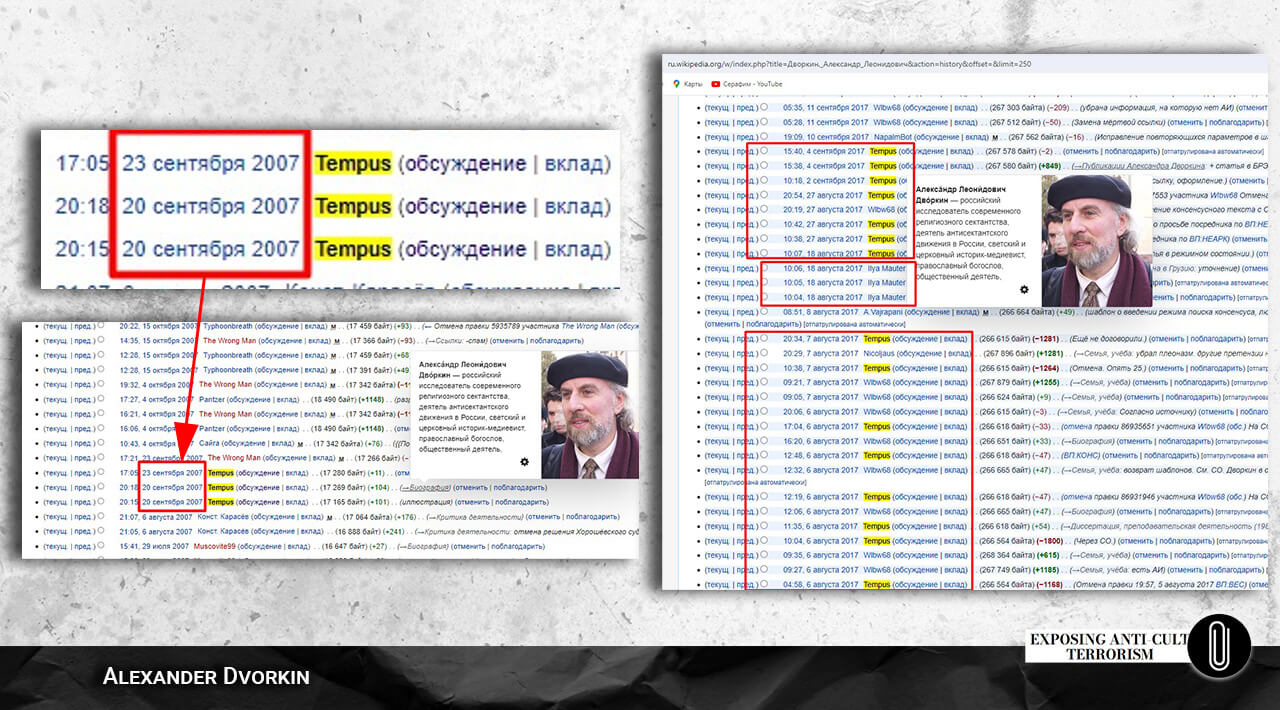
Finally, when we trace the edit history of the page for the Center for Religious Studies in the name of Hieromartyr Irenaeus, Bishop of Lyon, which was also founded by Dvorkin in 1993, the picture becomes clearer. Attention! In 2012 (when “Ilya Porkhachev” turned 24), a user under the nickname Tempus created a page for the Center in the name of Irenaeus of Lyon 6 and started actively filling it with content!
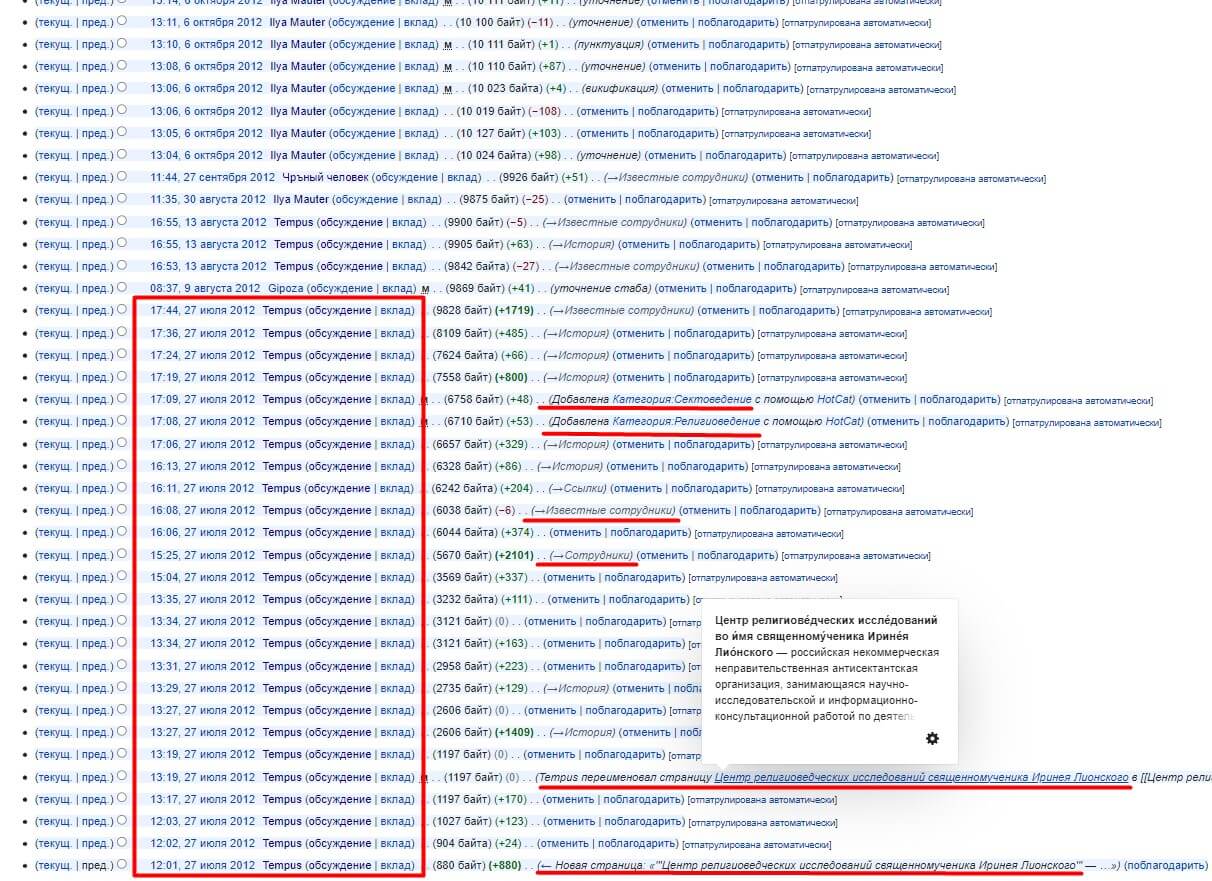

Besides, Tempus actively edited the page on Irenaeus of Lyon himself, a 2nd-century apologist and theologian, or rather a 2nd-century inquisitor who wrote the famous work “Against Heresies”:
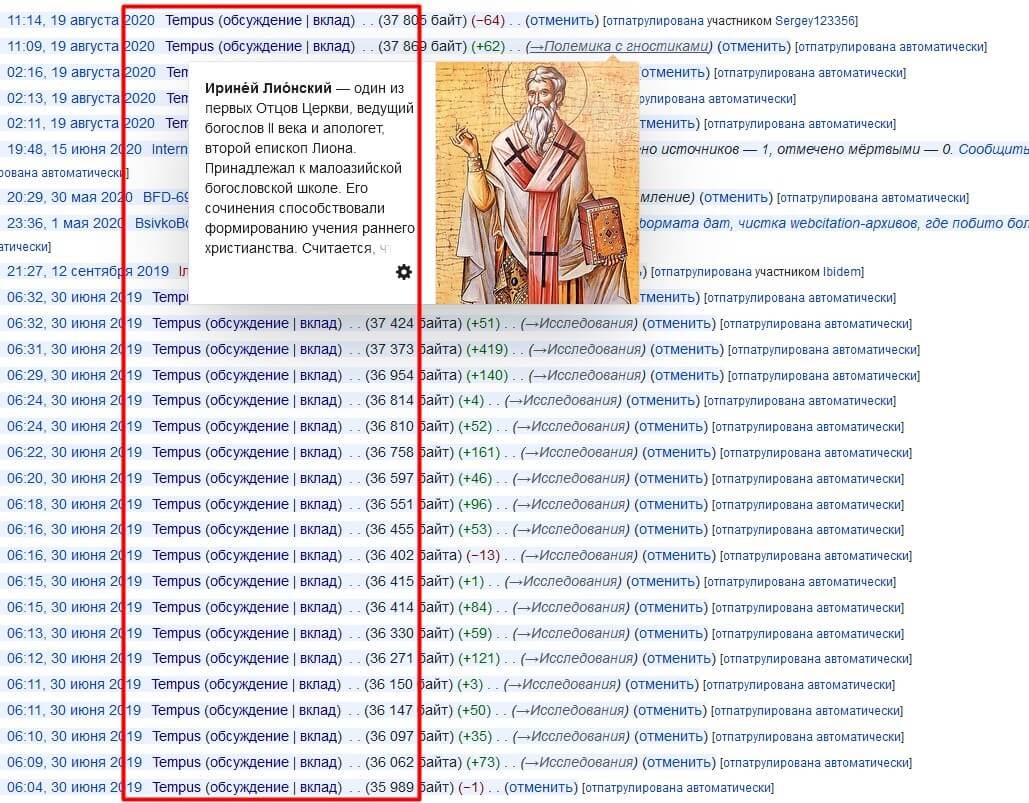
The deeper we delved into the scope of activities of the participant under the alias Tempus, the more convinced we became that no such person as Ilya Porkhachev actually exists. Even if he does, he has absolutely no connection to the aggressive anticult propaganda on Wikipedia.
“Ilya Porkhachev” is not a real person, but a mythical figure behind which stands either the terrorist organization RACIRS itself or a more serious group of specialists with deep intellectual knowledge in various fields. You will definitely see this as we continue. This group has actively engaged and continues to engage in shaping a positive image of the anticult movement and creation of a certain public opinion in its favor. In essence, they have developed their own version of global history, which the Russian-speaking Wikipedia audience takes for truth.
This is a clear example of deliberate manipulation over mass consciousness, which creates a positive image of sectologists and anticultists and their fight against “totalitarian sects” and “destructive cults”, making them appear indispensable in the eyes of the public. “Sects and cults are a threat that must be fought against!” – this is the constant message they repeat. The well-crafted propaganda strategy made possible through Wikipedia has enabled anticultism to present itself in a predominantly positive light.
This signifies a revival of the dark times of religious inquisition, and the situation is far from a joke, it’s obvious — just take a look at the devastated cities of Ukraine after the perfidious invasion by Russian forces. Just feel what it’s like to live without electricity, under constant air-raid alarms and the threat of missile strikes. All of this is a result of the actions of anticultists. For years, they’ve been brainwashing people’s consciousness, cultivating fear, hatred and intolerance, which has ultimately led to very tragic consequences. According to the latest message by Egon Cholakian in “The Crossroads” video, this is only the initial stage of upcoming events that can lead our country into civil war.
We appeal to rational people to actively study this problem. We still have time and resources to make a change.
We must understand the essence of what is happening!
Whom did Tempus edit among Russian anticultists?
Due to the scope of material, we won’t be able to include all the data we found into this article, as the activities of this figure are quite extensive. Yet, we will certainly try to provide a more complete picture in the future.
In the meantime, let’s list those individuals already known to us in whose pages a Russian resident under the alias Tempus ‘’had a hand‘.’ The list is surely far from being complete!
- Alexander Dvorkin,
- Alexander Novopashin,
- Roman Silantyev,
- Dmitry Smirnov,
- Andrey Kuraev,
- Vladimir Martinovich (Belarus),
- Evgeny Mukhtarov…

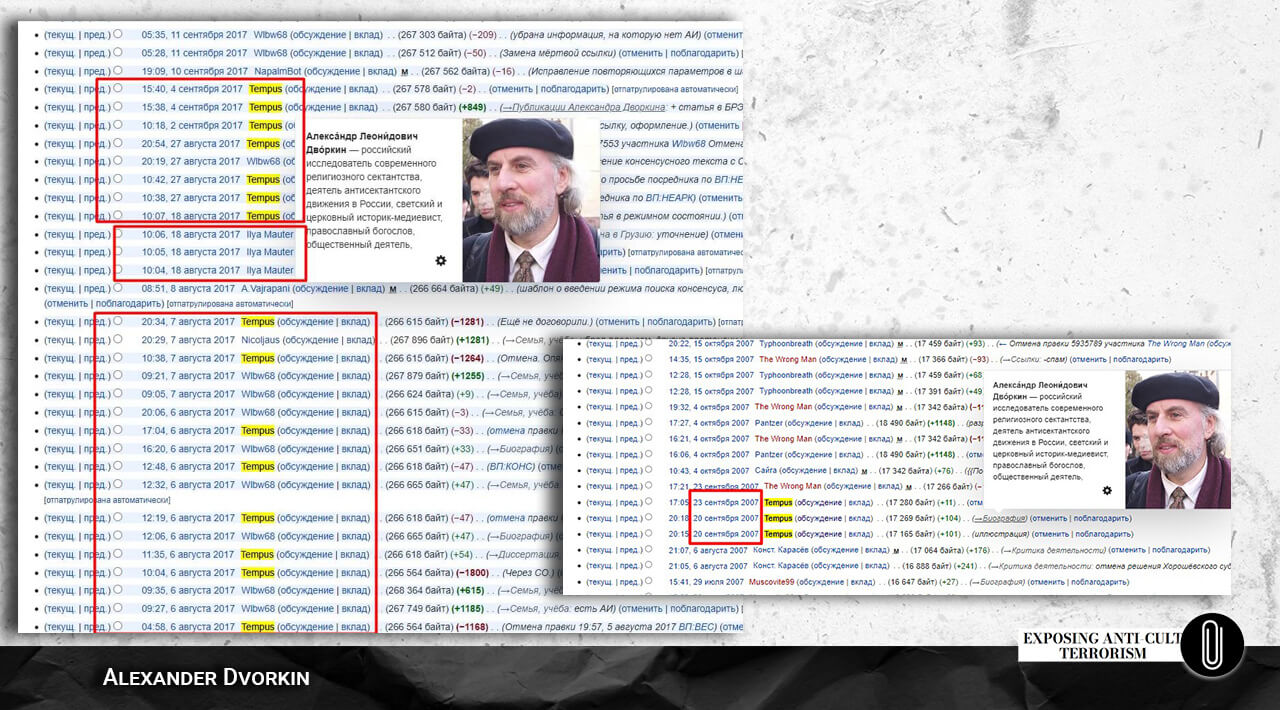
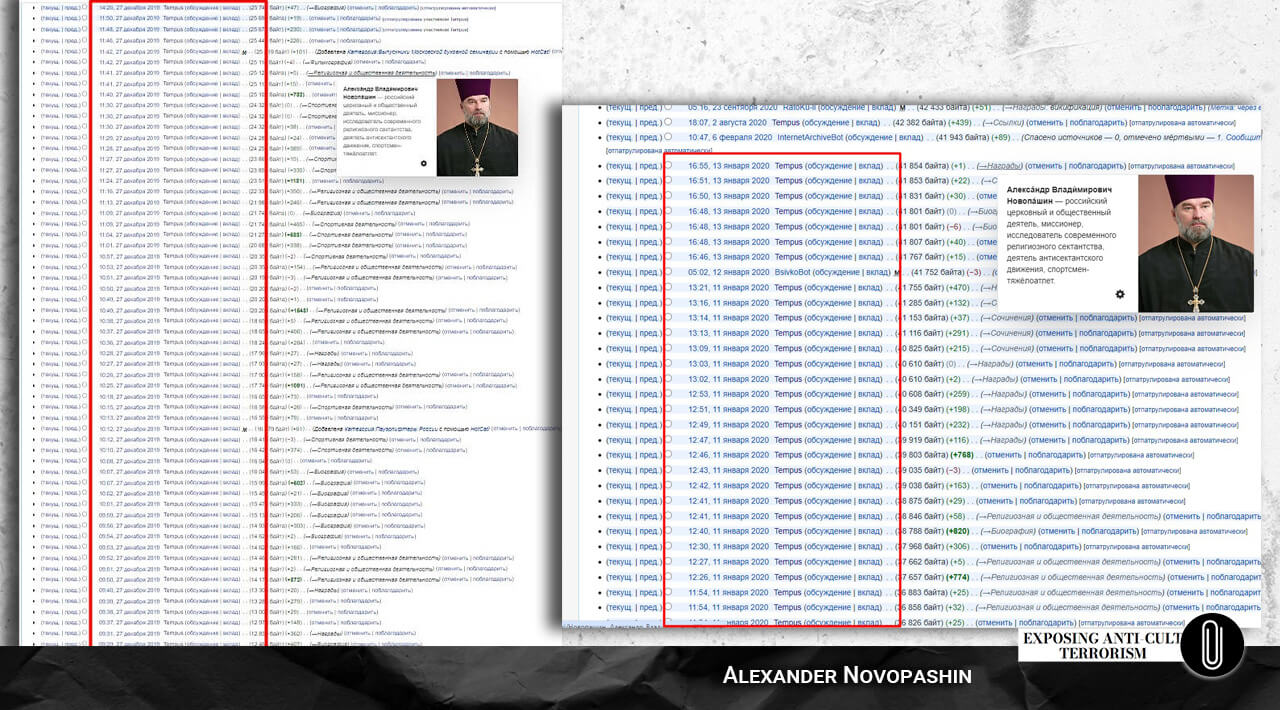
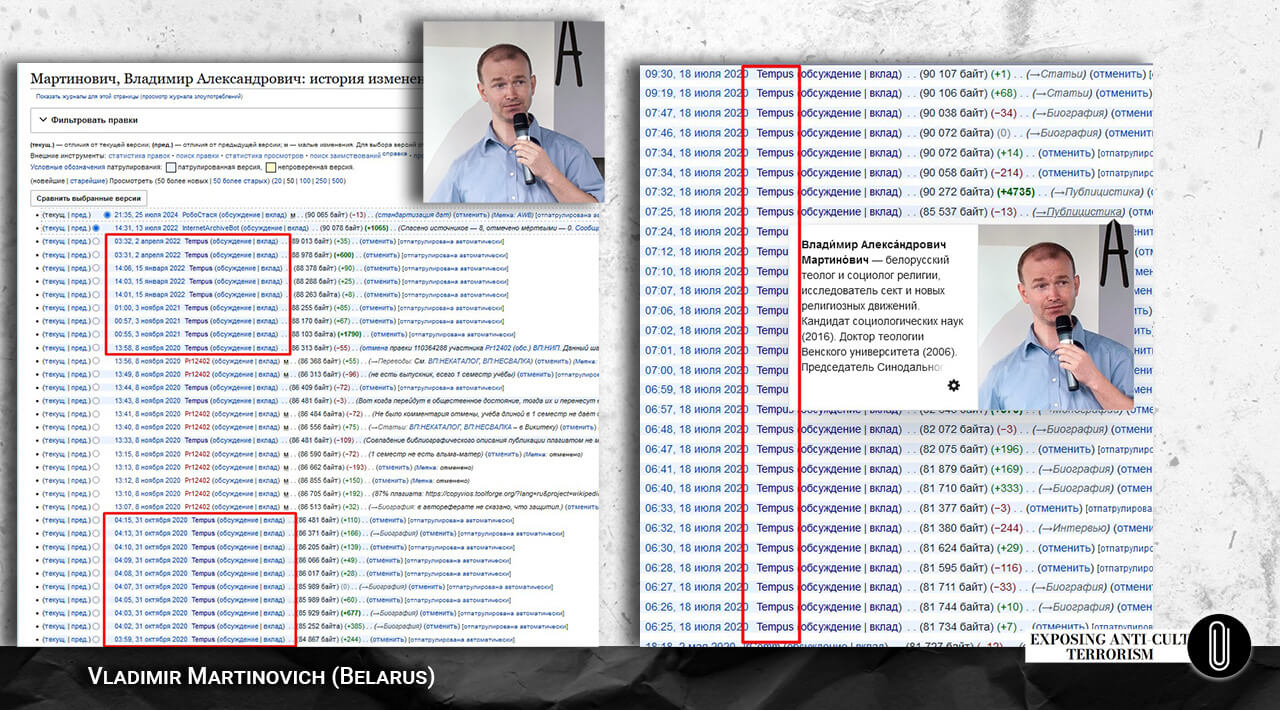
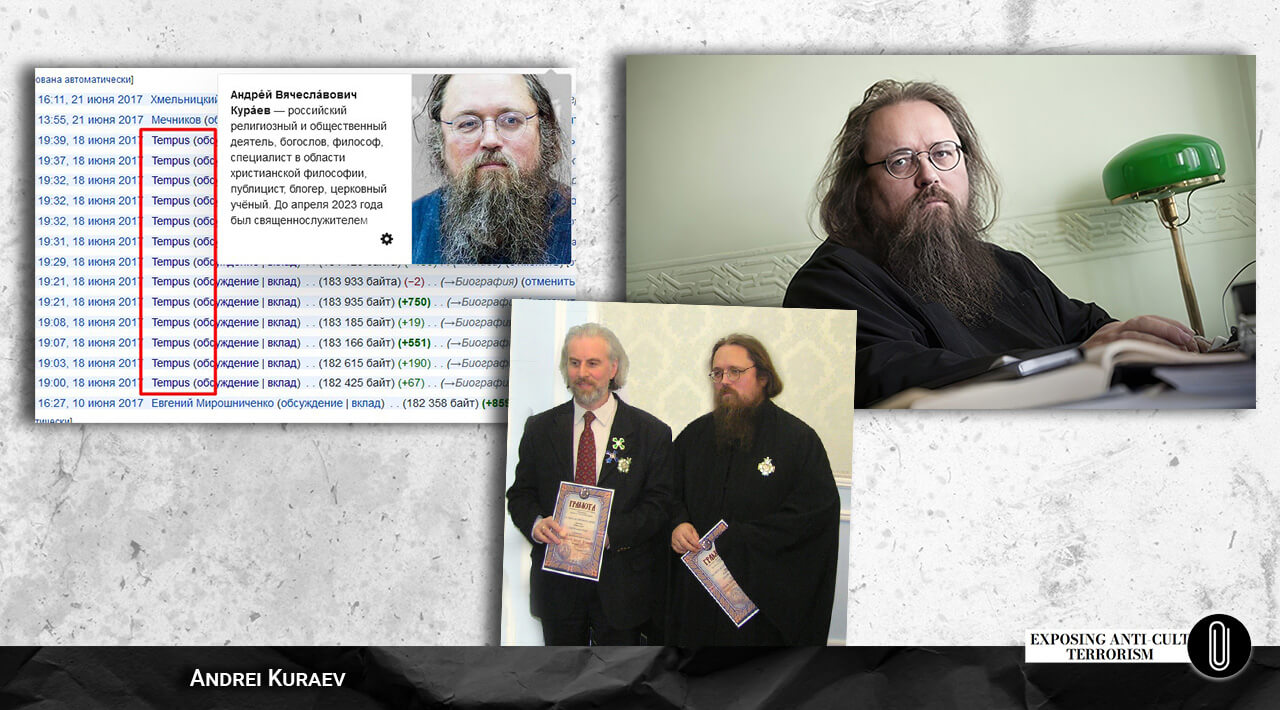
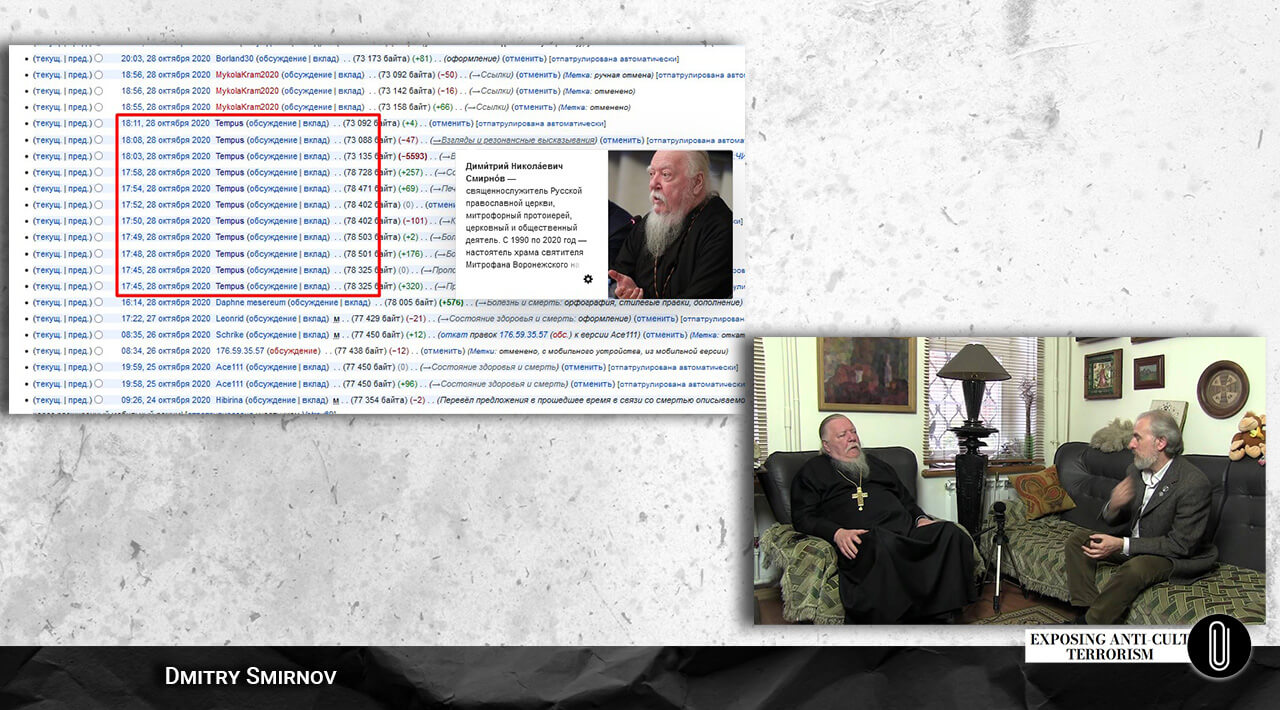
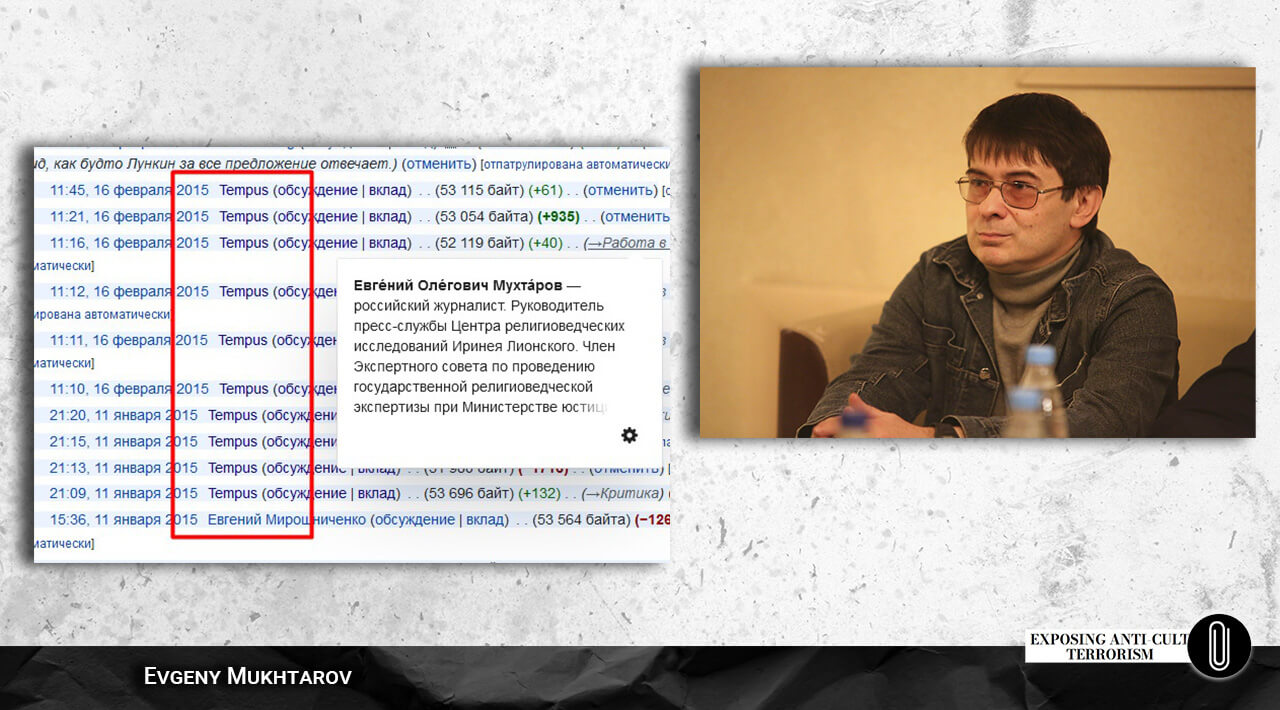
Whom did Tempus edit among foreign anticultists?
While Tempus-Porkhachev’s involvement in contributing to anticult propaganda on the Russian Wikipedia may be explained at least by his national affiliation, the next question arises: where does his interest in the history of international anticultism originate from?
Consider for yourselves: at the very least, he has edited the following pages:
Friedrich Wilhelm Haack (more information about him is available in “The IMPACT” documentary);
- Margaret Singer (board member of the anticult organization American Family Foundation (AFF), 1979–2004);
- Roger Ikor (founder of the French anticult organization CCMM);
- Ted Patrick (founder of the Cult Awareness Network (CAN));
- Johannes Aagaard (founder of Dialog Center International);
- Rick Alan Ross (American anticultist);
- Janja Lalich (American sociologist, member of FECRIS);
- Eileen Barker (founder of the British anticult organization INFORM);
- Michael D. Langone (executive director of the American anticult organization AFF, editor of the academic journal “Cultic Studies Review”);
- Robert Jay Lifton (American psychiatrist);
- George D. Chryssides (British researcher of new religious movements and cults);
- Walter Ralston Martin (American Baptist Christian minister who significantly influenced the anticult movement in the United States)…


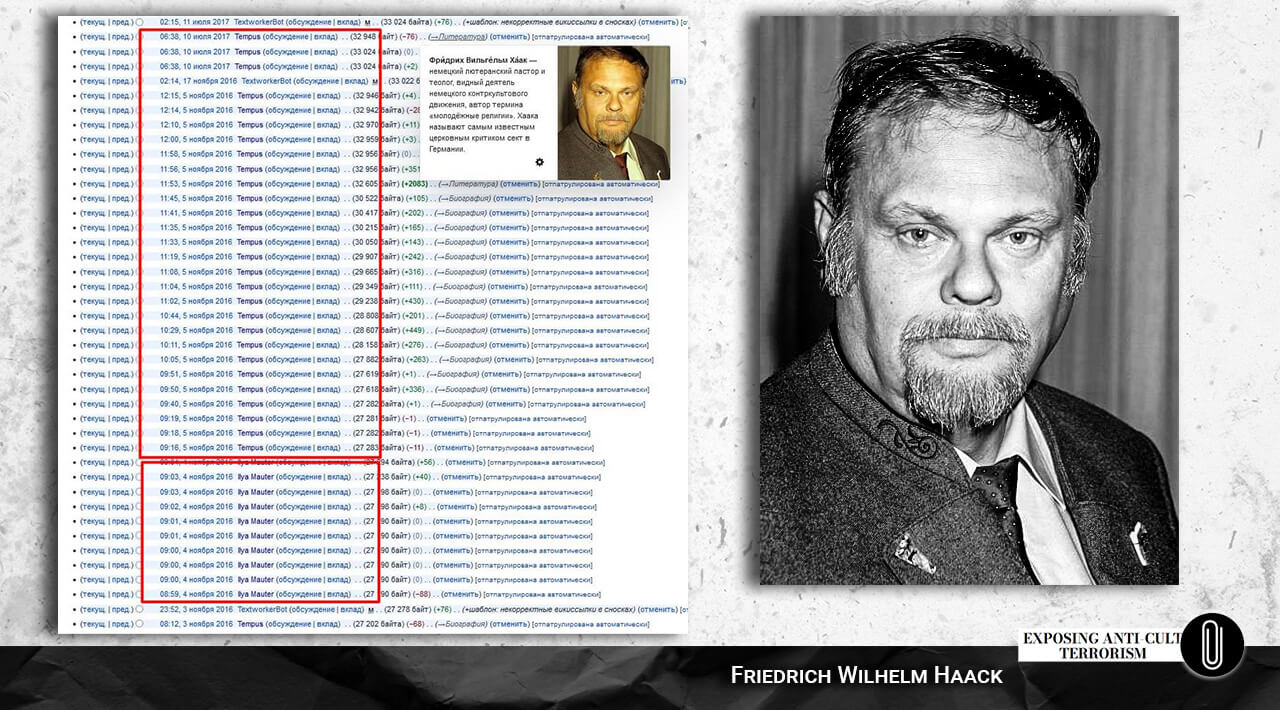
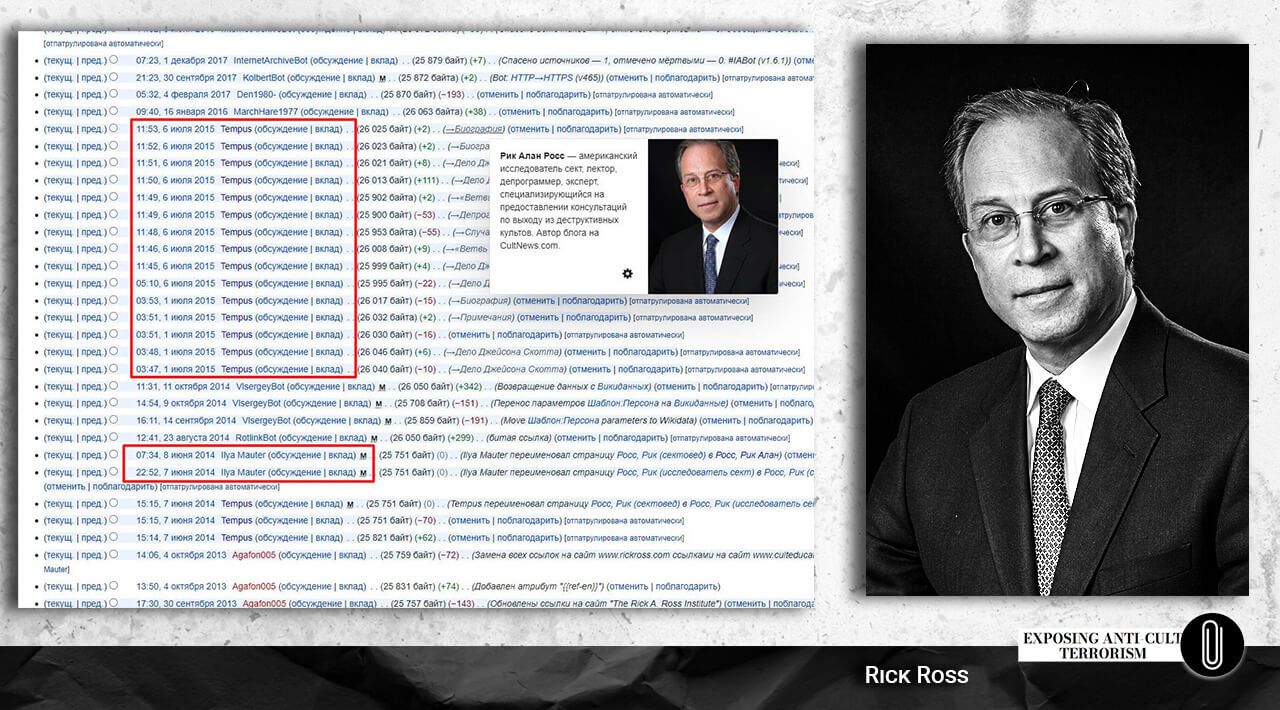
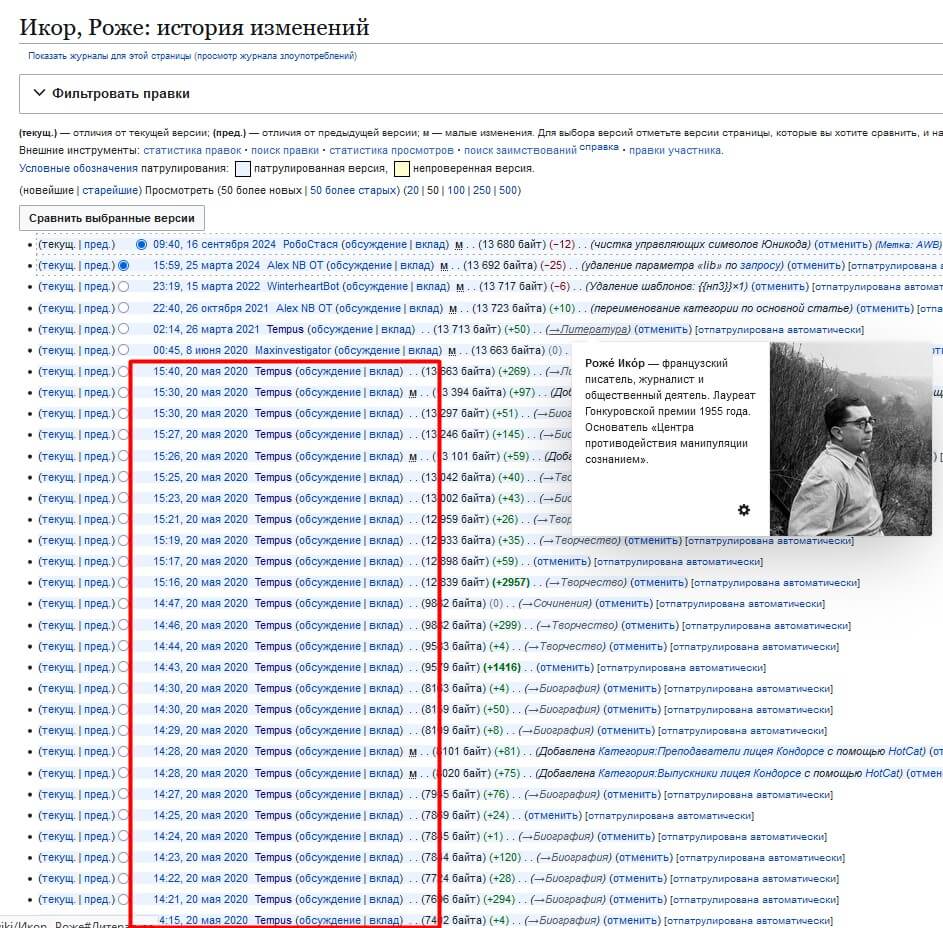
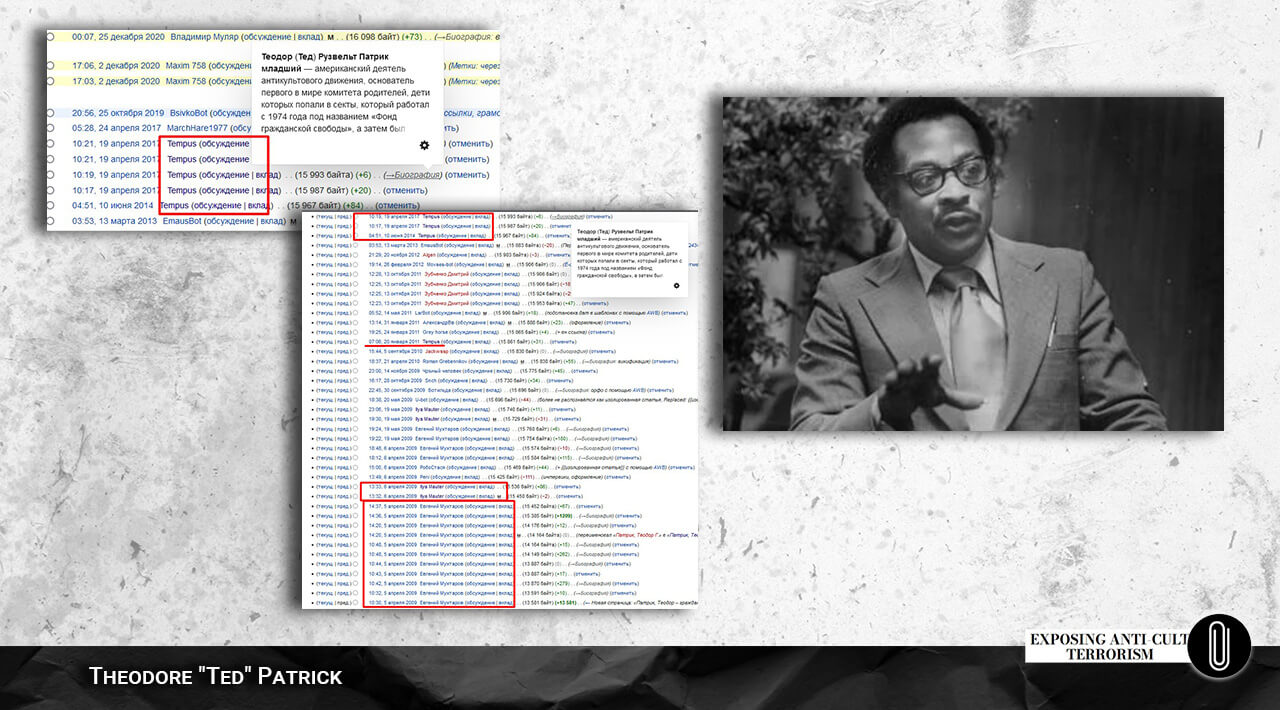
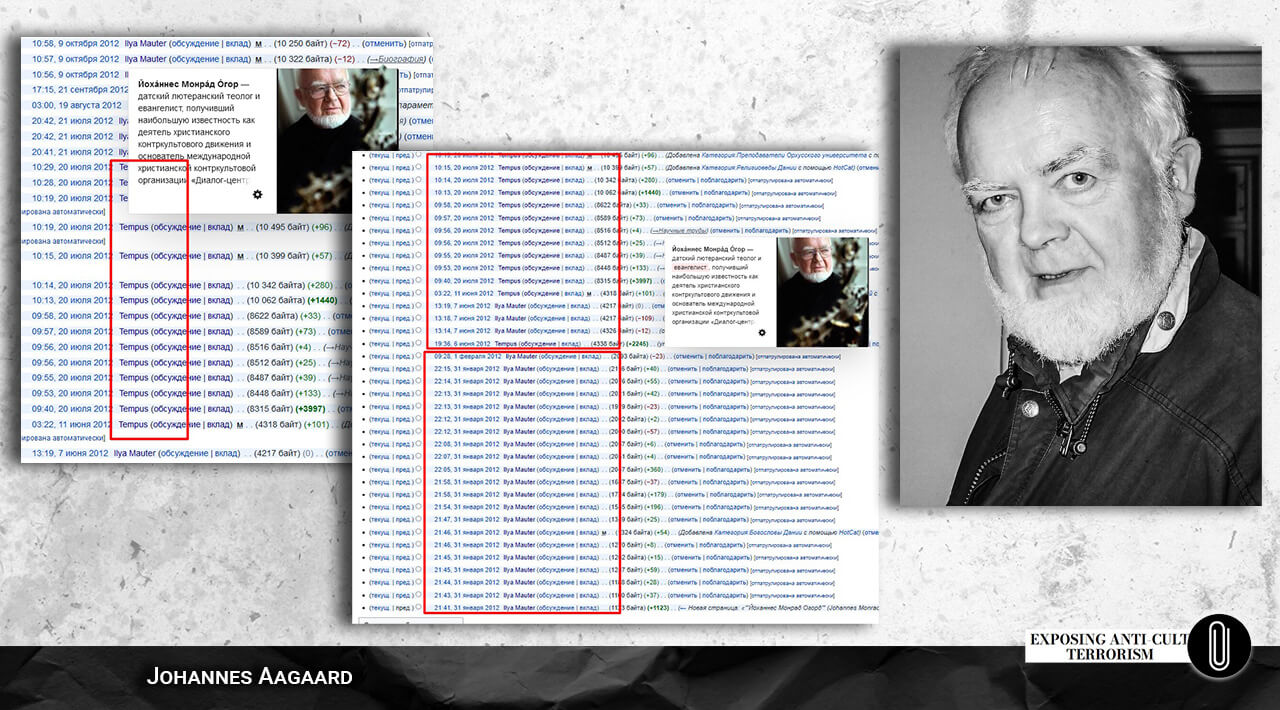
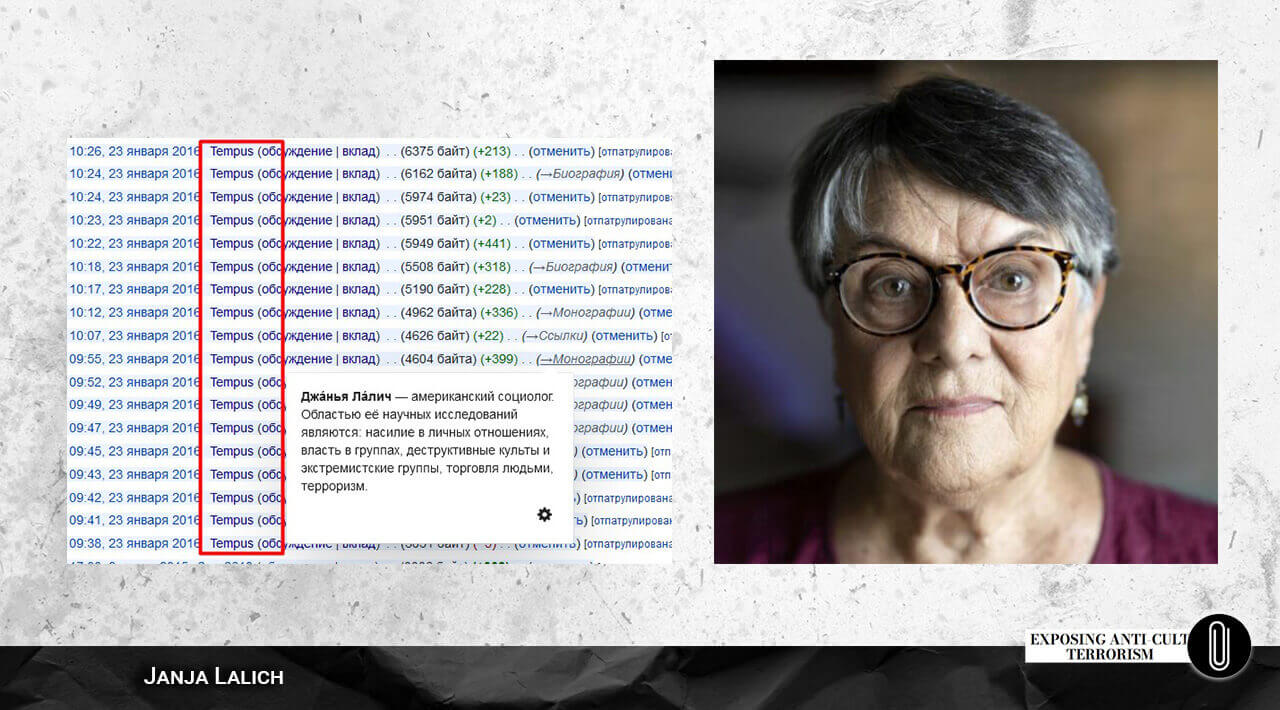
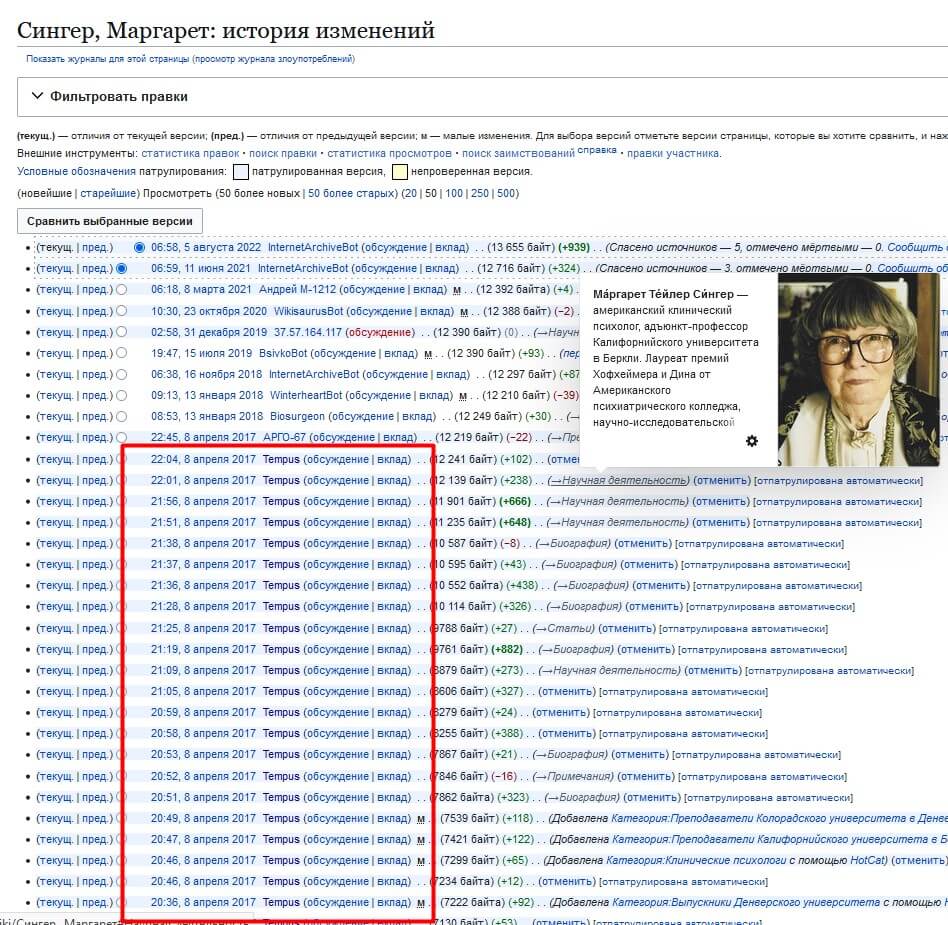
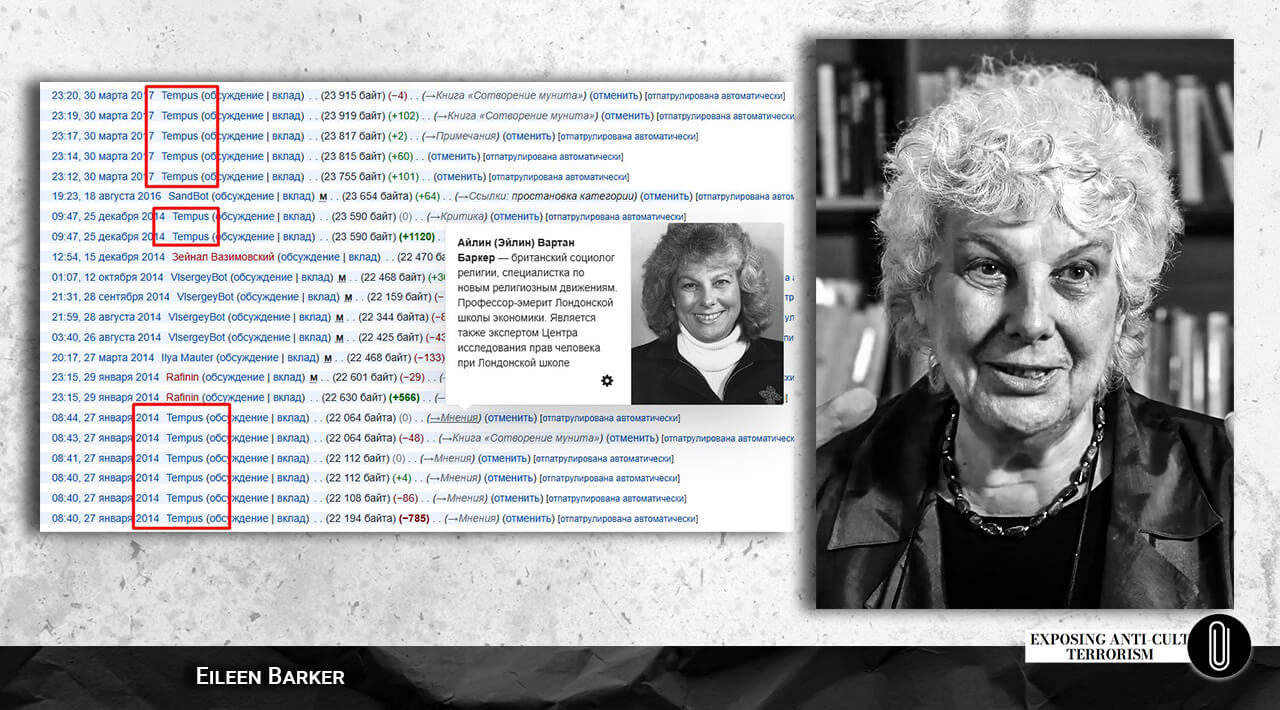
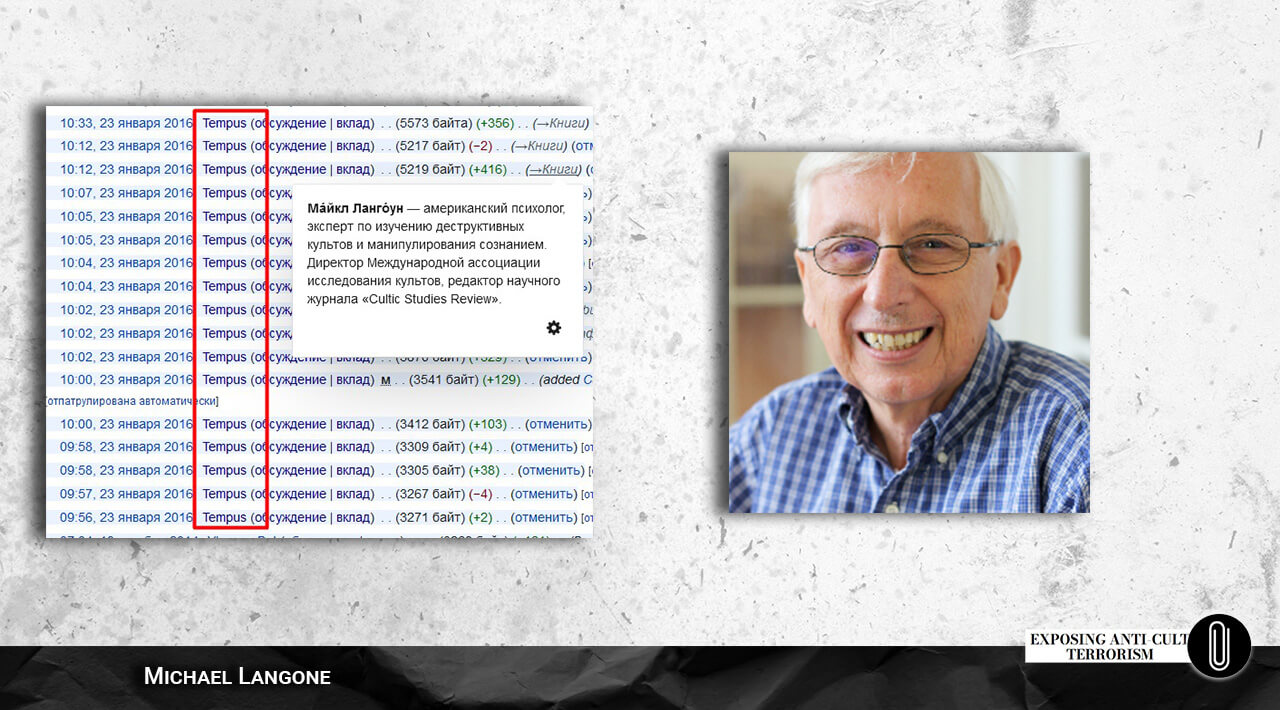
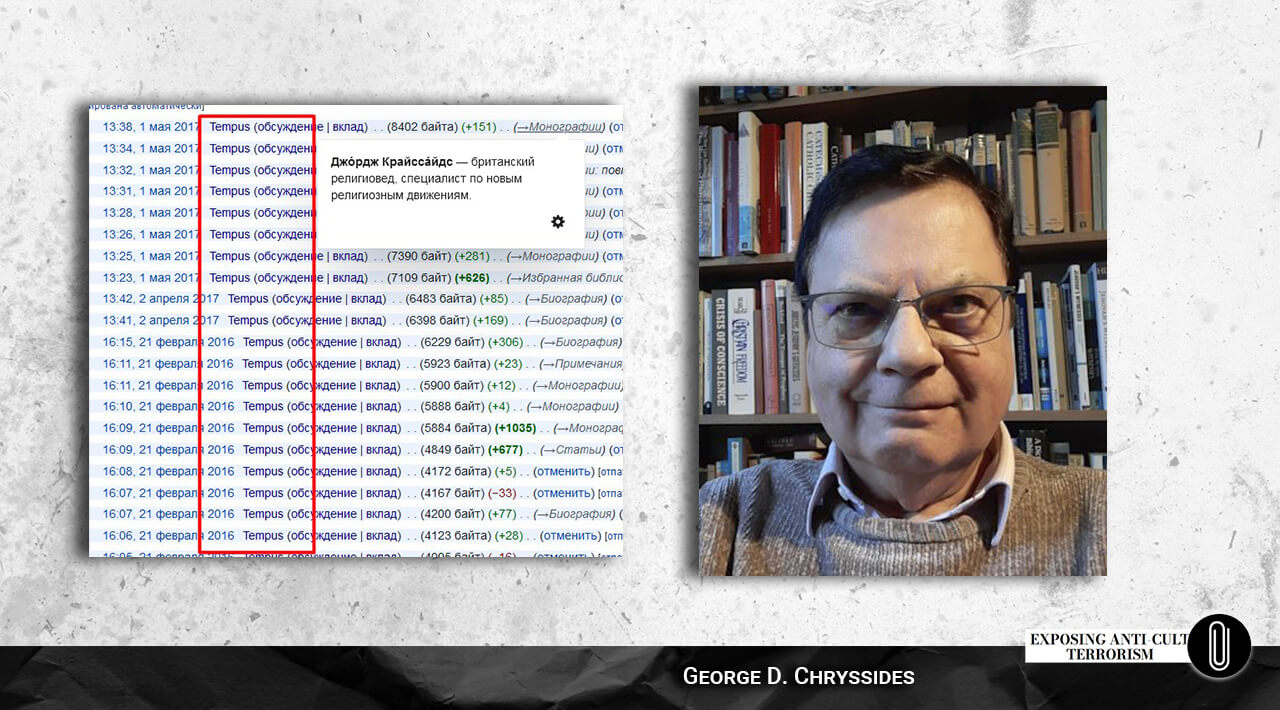
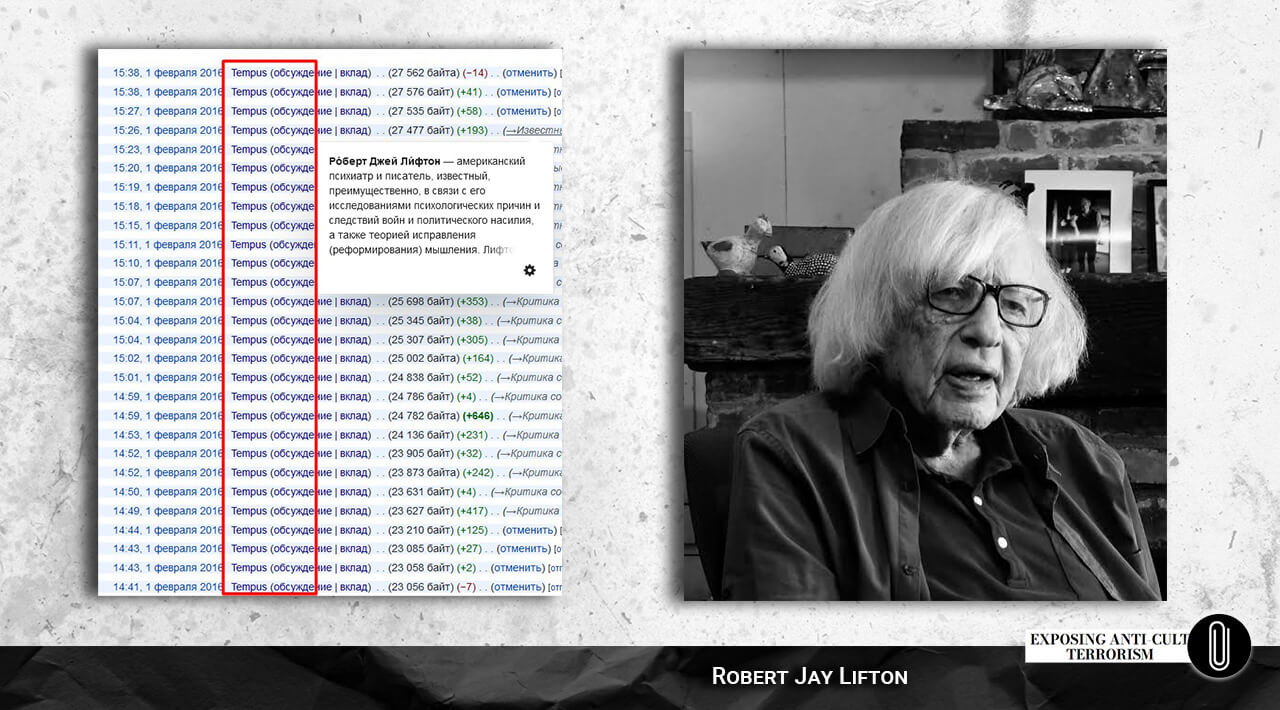
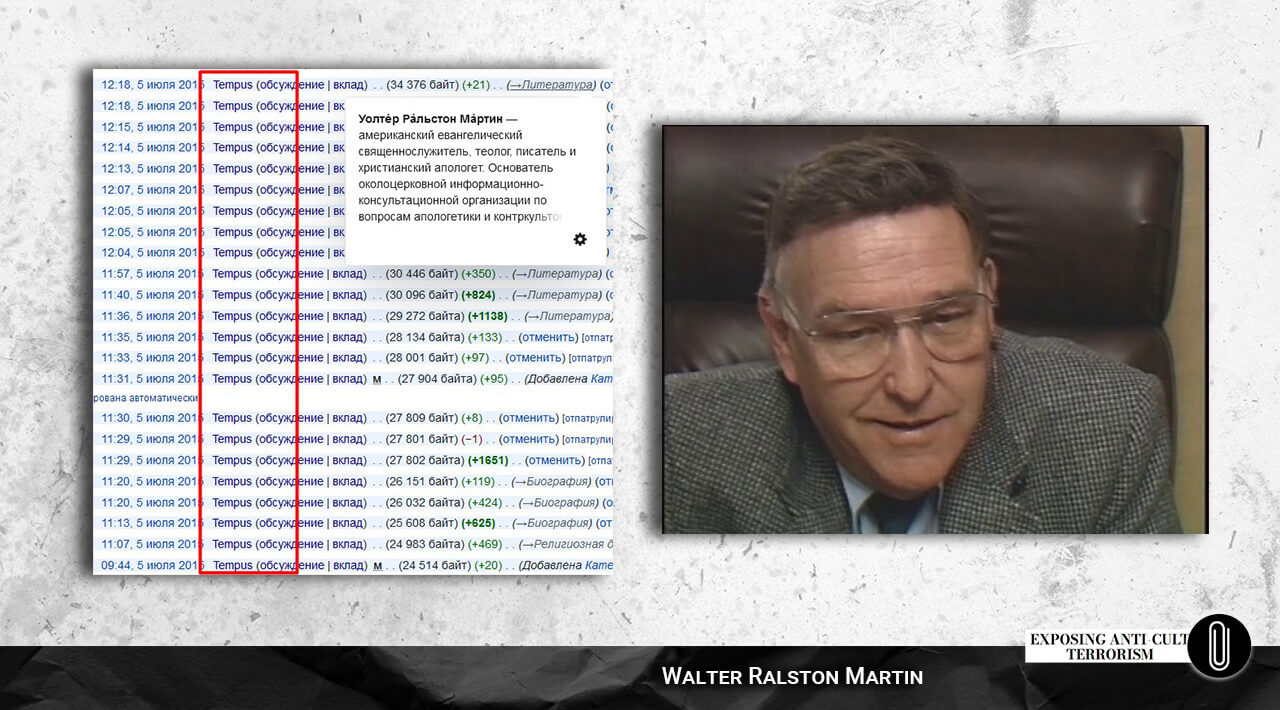
Why did Tempus edit these pages?
The answer is obvious: someone was crafting history! They were correcting, deleting the unnecessary, editing, patrolling, and creating content. Every action by Tempus was a step toward shaping a new informational landscape. Word by word, sentence by sentence, a new reality was emerging, and it no longer matters to what extent it reflected the truth. The key question is: WHO was behind its creation?
Behind it, was anticultism.
Thanks to Wikipedia’s open editorial policy, we can trace the entire editing path of the “wunderkind prodigy” from Krasnoyarsk, Ilya Porkhachev. His edits, the articles he created, the formatting — all of that is available for analysis: what exactly he edited, when, and even at what time of the day.
Ironically, Tempus hardly expected that their hyperactive educational activities would one day be viewed under a magnifying glass, as if under a bright spotlight, piecing together seemingly disparate fragments. They didn’t expect it, but all secrets eventually come to light. That’s why we are here. So that all of us, dear readers, have a chance to correct the tragic scenario they have intended.
To be continued!
Sources:
1. https://en.wikipedia.org/wiki/Rick_Alan_Ross
2. https://ru.wikipedia.org/wiki/%D0%A0%D0%BE%D1%81%D1%81,_%D0%A0%D0%B8%D0%BA_%D0%90%D0%BB%D0%B0%D0%BD
3. http://web.archive.org/web/20240520052659/http://www.sclj.ru/massmedia/detail.php?SECTION_ID=488&ELEMENT_ID=7723
4. https://ru.wikipedia.org/wiki/%D0%A3%D1%87%D0%B0%D1%81%D1%82%D0%BD%D0%B8%D0%BA:Tempus/%D0%9E%D0%B1%D0%BE_%D0%BC%D0%BD%D0%B5
5. https://ru.wikipedia.org/wiki/%D0%A3%D1%87%D0%B0%D1%81%D1%82%D0%BD%D0%B8%D0%BA:Tempus/%D0%91%D0%B8%D0%B1%D0%BB%D0%B8%D0%BE%D0%B3%D1%80%D0%B0%D1%84%D0%B8%D1%8F
6. https://ru.wikipedia.org/wiki/%D0%A6%D0%B5%D0%BD%D1%82%D1%80_%D1%80%D0%B5%D0%BB%D0%B8%D0%B3%D0%B8%D0%BE%D0%B2%D0%B5%D0%B4%D1%87%D0%B5%D1%81%D0%BA%D0%B8%D1%85_%D0%B8%D1%81%D1%81%D0%BB%D0%B5%D0%B4%D0%BE%D0%B2%D0%B0%D0%BD%D0%B8%D0%B9_%D0%B2%D0%BE_%D0%B8%D0%BC%D1%8F_%D1%81%D0%B2%D1%8F%D1%89%D0%B5%D0%BD%D0%BD%D0%BE%D0%BC%D1%83%D1%87%D0%B5%D0%BD%D0%B8%D0%BA%D0%B0_%D0%98%D1%80%D0%B8%D0%BD%D0%B5%D1%8F_%D0%9B%D0%B8%D0%BE%D0%BD%D1%81%D0%BA%D0%BE%D0%B3%D0%BE
